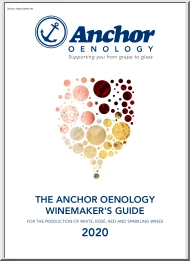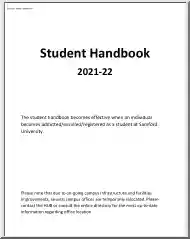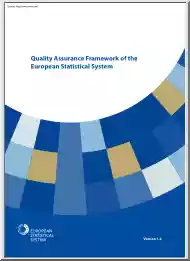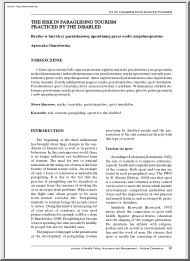A doksi online olvasásához kérlek jelentkezz be!
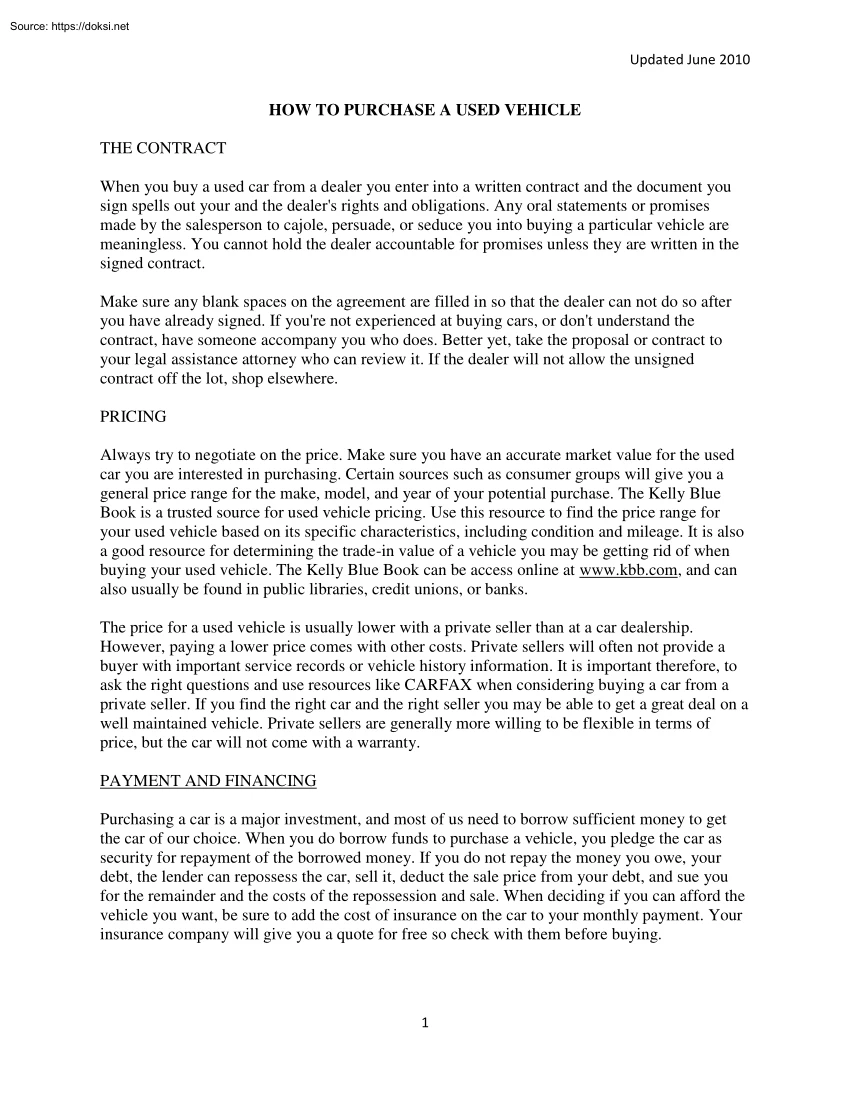
A doksi online olvasásához kérlek jelentkezz be!
Nincs még értékelés. Legyél Te az első!
Mit olvastak a többiek, ha ezzel végeztek?
Tartalmi kivonat
Updated June 2010 HOW TO PURCHASE A USED VEHICLE THE CONTRACT When you buy a used car from a dealer you enter into a written contract and the document you sign spells out your and the dealer's rights and obligations. Any oral statements or promises made by the salesperson to cajole, persuade, or seduce you into buying a particular vehicle are meaningless. You cannot hold the dealer accountable for promises unless they are written in the signed contract. Make sure any blank spaces on the agreement are filled in so that the dealer can not do so after you have already signed. If you're not experienced at buying cars, or don't understand the contract, have someone accompany you who does. Better yet, take the proposal or contract to your legal assistance attorney who can review it. If the dealer will not allow the unsigned contract off the lot, shop elsewhere. PRICING Always try to negotiate on the price. Make sure you have an accurate market value for the used car you are
interested in purchasing. Certain sources such as consumer groups will give you a general price range for the make, model, and year of your potential purchase. The Kelly Blue Book is a trusted source for used vehicle pricing. Use this resource to find the price range for your used vehicle based on its specific characteristics, including condition and mileage. It is also a good resource for determining the trade-in value of a vehicle you may be getting rid of when buying your used vehicle. The Kelly Blue Book can be access online at wwwkbbcom, and can also usually be found in public libraries, credit unions, or banks. The price for a used vehicle is usually lower with a private seller than at a car dealership. However, paying a lower price comes with other costs. Private sellers will often not provide a buyer with important service records or vehicle history information. It is important therefore, to ask the right questions and use resources like CARFAX when considering buying a car
from a private seller. If you find the right car and the right seller you may be able to get a great deal on a well maintained vehicle. Private sellers are generally more willing to be flexible in terms of price, but the car will not come with a warranty. PAYMENT AND FINANCING Purchasing a car is a major investment, and most of us need to borrow sufficient money to get the car of our choice. When you do borrow funds to purchase a vehicle, you pledge the car as security for repayment of the borrowed money. If you do not repay the money you owe, your debt, the lender can repossess the car, sell it, deduct the sale price from your debt, and sue you for the remainder and the costs of the repossession and sale. When deciding if you can afford the vehicle you want, be sure to add the cost of insurance on the car to your monthly payment. Your insurance company will give you a quote for free so check with them before buying. 1 Updated June 2010 If you finance the car, you'll do it
either through the dealer’s financing or through a financial institution that will loan you the money to pay the dealer. Shopping for the best auto loan rates yourself can be as easy as checking the newspaper. Many institutions will give a discount to military personnel, so be sure to ask. If the dealer arranges your financing, get the name and contact information of the lender the dealer is using in case problems occur in the future. Some payment do NOTs: DO NOT be lulled into accepting whatever lender the dealer finds, and do not allow the dealer to exaggerate your creditworthiness to a prospective lender in order to secure the lender's approval of your loan. To do so would be fraud, a criminal offense, and would cause you to buy a vehicle that you actually cannot afford. DO NOT give the dealer a down payment until your financing is totally approved. Any dealer who demands or asks for a check or cash in advance of your financing approval is not trustworthy. DO NOT take the car
off the lot or leave your old car on the lot until you are sure of financing. WARRANTIES Beware of a used car trap. Your purchase agreement likely will not have a warranty included A warranty ensures the car will perform according to specific representations or promises made by the dealer or manufacturer, sometime ensuring as little as the car will at least run. Used cars, however, are often sold "as is"- so if it falls apart after driving three miles, you're stuck with your new broken down car. Therefore you can, and should, try to negotiate a short term warranty covering a percentage of parts and labor. 100% is ideal but you should at least try for 50% of parts and labor. The Federal Trade Commission (FTC) has a used car rule that protects buyers. It requires all used car dealers to place a notice in the window of each used car for sale. Make sure this FTC mandated notice is there! If it is missing you should be wary of the dealer and the vehicle. The notice must give
the following information: Whether the car comes with a warranty and, if so, what specific warranty protection the dealer will provide. Whether the vehicle comes with no warranty ("as is") or with implied warranties only. That you should have the car inspected by a mechanic before you buy it. That any promises the dealer makes should be in writing. Major problems that may happen with a used car. [FTC Facts for Consumers, "Buying a Used Car"] 2 Updated June 2010 VEHICLE HISTORY REPORT Used cars can often have hidden problems as the result of accidents throughout the car’s life. To avoid buying a car that looks good but really has costly hidden problems, use a tool like CARFAX. Such a tool gives a comprehensive vehicle history report and checks for things like accidents, flooding, fires, number of owners, and service records. CARFAX can be accessed online at www.carfaxcom Many of its services are free, like the lemon check, so you
might as well ensure the vehicle you are buying does not have hidden problems. Here is the short list of questions to ask a private party seller (and dealer) in order to ensure the car’s good upkeep and condition: - When did you buy the car? How many previous owners before you? - Current mileage? - Any previous accidents? Major repairs? Any repair needed now? - What is the mechanical condition? Any concerns? - What is the general condition of the car? Interior? Exterior? - Any rust? Scratches? Any other damages? - Where has the car been serviced? Are the service records available? - What is the reason for selling the car? - Any liens? CALIFORNIA’S LEMON LAW This law requires that if the manufacturer or its representative in this state, such as an authorized dealer, is unable to service or repair a new motor vehicle to meet the terms of an express written warranty after a reasonable number of repair attempts, the manufacturer is required promptly to replace the vehicle or return the
purchase price to the lessee or buyer. However, although the special protections provided for by California’s Lemon Law apply to new motor vehicles, the law has many general rules that apply to any consumer product sold with an express written warranty, including used cars. As a result, there is important coverage for both used vehicles sold with a dealer's express written warranty and "lemon" vehicles repurchased by the manufacturer and sold to consumers with an express written warranty covering the defect. Coverage is not identical to the coverage for new motor vehicles but it does provide for some protection in the used car purchase process. For example, a warrantor who is unable to conform a consumer product to its express warranty within a reasonable number of attempts is required to replace the goods or refund the purchase price less an amount attributable to the consumer's use. Unlike the special rules on new motor vehicles, however, there is no set 3
Updated June 2010 formula for determining the charge for the consumer's use before the discovery of the defect, and the Lemon Law presumption does not apply. PAPERWORK AND TASKS TO COMPLETE THE PURCHASE If you end up purchasing a vehicle registered in California, you will need to transfer the ownership within 10 days from the date of purchase. You will need to visit a DMV office to transfer vehicle ownership once you buy the car. You can call 1-800-777-0133 to make an appointment at a local DMV office near you or make an appointment online. Making an appointment will help you to avoid long lines and wasted hours at the DMV. You will need a properly endorsed title, also known as a pink slip, with the previous owner's signature on line one. If the vehicle is or was financed, line two of the title will also require a releasing signature. If the title is lost, an Application for Duplicate Title (REG 227) must be completed and signed. There is an additional fee for a duplicate
title and signatures of the legal owner and lien-holder must be notarized. If the vehicle was not purchased from the owner whose name appears on the title, you will need a bill of sale from each in-between buyer. The odometer mileage is required if the vehicle is less than 10 years old. If the title does not have a designated space for this information, the odometer mileage disclosure must be reported on a Vehicle/ Vessel Transfer and Reassignment Form (REG 262) signed by both the seller and the buyer. The REG 262 cannot be copied An original must be submitted To obtain a form by mail, call DMV's automated phone service 24 hours a day, 7 days a week at 1-800-777-0133. To speak to an operator call between the hours of 8 a.m and 5 pm Monday - Friday, Pacific Standard Time, or pick one up from your local DMV. Further information about the purchase of a used vehicle can be obtained online at http://www.dmvcagov SMOG INSPECTION CERTIFICATION In California a smog certification is
required when buying a used vehicle. The seller is required to provide the buyer (you) with a valid smog inspection certification at the time of the sale or transfer. Smog certifications are good for 90 days from the date of issuance If the date is more than 90 days old, the seller needs to get a new certificate before you buy the car. The smog certification is not required if a biennial certification was submitted to the DMV in conjunction with renewal fees within 90 days prior to the vehicle transfer date. A statement to that effect must be signed by the seller or the buyer. A vehicle inspection report may be required for proof of certification. When you transfer a vehicle that is four or less model years old a smog certification will not be 4 Updated June 2010 required. The four or less model years old rule does not apply to diesel powered vehicles A smog transfer fee will be collected from the new owner. When a vehicle is more than four model years old, evidence of a current
smog certification must be provided by a seller except when the following occurs: - - The transfer occurs between a spouse, domestic partner, sibling, child, parent, grandparent, or grandchild. Other family members or relations are not exempt and are required to obtain a smog inspection certification. A biennial smog certification was submitted to DMV within 90 days prior to the vehicle transfer date (a vehicle inspection report may be required for proof of certification). Smog inspections are required unless your vehicle is a hybrid, gasoline powered 1975 model or older, diesel powered manufactured prior to 1998 or with a Gross Vehicle Weight rating (GVWR) of more than 14,000 lbs, electric, natural gas powered with a GVWR rating of more than 14,000 lbs., motorcycle, or a trailer There is no military exemption to the smog inspection requirement. IF PROBLEMS ARISE – SMALL CLAIMS COURT Buying from a private seller is risky and if the seller adding the words “as is” to the
contract or sale documentation, you are out of luck if something goes wrong. However, there are situations when you may hold a private seller responsible for problems arising with your recently purchased used vehicle. In the event the seller fraudulently sold you a problem car you may seek payment or restoration of lost funds in small claims court. To prove fraud in a used car sale you would have to prove that the seller lied or tricked you on purpose in order to get you to buy the problem car. Furthermore, you may seek redress in small claims court and invoke the Lemon Law if you feel the seller sold you a lemon vehicle. In California small claims court individuals may seek no more than $7500 for a single claim and may not be represented by a lawyer. For more information on the small claims court you may visit the website online at http://www.courtinfocagov/selfhelp/smallclaims/ FURTHER HELP IS AVAILABLE For appointments concerning consumer and other personal legal matters, call the
Legal Assistance Branch of the Office of the Staff Judge Advocate located at Building 275, Plummer Street, Defense Language Institute, Presidio of Monterey (831-242-5084 or DSN 768-5084). 5
interested in purchasing. Certain sources such as consumer groups will give you a general price range for the make, model, and year of your potential purchase. The Kelly Blue Book is a trusted source for used vehicle pricing. Use this resource to find the price range for your used vehicle based on its specific characteristics, including condition and mileage. It is also a good resource for determining the trade-in value of a vehicle you may be getting rid of when buying your used vehicle. The Kelly Blue Book can be access online at wwwkbbcom, and can also usually be found in public libraries, credit unions, or banks. The price for a used vehicle is usually lower with a private seller than at a car dealership. However, paying a lower price comes with other costs. Private sellers will often not provide a buyer with important service records or vehicle history information. It is important therefore, to ask the right questions and use resources like CARFAX when considering buying a car
from a private seller. If you find the right car and the right seller you may be able to get a great deal on a well maintained vehicle. Private sellers are generally more willing to be flexible in terms of price, but the car will not come with a warranty. PAYMENT AND FINANCING Purchasing a car is a major investment, and most of us need to borrow sufficient money to get the car of our choice. When you do borrow funds to purchase a vehicle, you pledge the car as security for repayment of the borrowed money. If you do not repay the money you owe, your debt, the lender can repossess the car, sell it, deduct the sale price from your debt, and sue you for the remainder and the costs of the repossession and sale. When deciding if you can afford the vehicle you want, be sure to add the cost of insurance on the car to your monthly payment. Your insurance company will give you a quote for free so check with them before buying. 1 Updated June 2010 If you finance the car, you'll do it
either through the dealer’s financing or through a financial institution that will loan you the money to pay the dealer. Shopping for the best auto loan rates yourself can be as easy as checking the newspaper. Many institutions will give a discount to military personnel, so be sure to ask. If the dealer arranges your financing, get the name and contact information of the lender the dealer is using in case problems occur in the future. Some payment do NOTs: DO NOT be lulled into accepting whatever lender the dealer finds, and do not allow the dealer to exaggerate your creditworthiness to a prospective lender in order to secure the lender's approval of your loan. To do so would be fraud, a criminal offense, and would cause you to buy a vehicle that you actually cannot afford. DO NOT give the dealer a down payment until your financing is totally approved. Any dealer who demands or asks for a check or cash in advance of your financing approval is not trustworthy. DO NOT take the car
off the lot or leave your old car on the lot until you are sure of financing. WARRANTIES Beware of a used car trap. Your purchase agreement likely will not have a warranty included A warranty ensures the car will perform according to specific representations or promises made by the dealer or manufacturer, sometime ensuring as little as the car will at least run. Used cars, however, are often sold "as is"- so if it falls apart after driving three miles, you're stuck with your new broken down car. Therefore you can, and should, try to negotiate a short term warranty covering a percentage of parts and labor. 100% is ideal but you should at least try for 50% of parts and labor. The Federal Trade Commission (FTC) has a used car rule that protects buyers. It requires all used car dealers to place a notice in the window of each used car for sale. Make sure this FTC mandated notice is there! If it is missing you should be wary of the dealer and the vehicle. The notice must give
the following information: Whether the car comes with a warranty and, if so, what specific warranty protection the dealer will provide. Whether the vehicle comes with no warranty ("as is") or with implied warranties only. That you should have the car inspected by a mechanic before you buy it. That any promises the dealer makes should be in writing. Major problems that may happen with a used car. [FTC Facts for Consumers, "Buying a Used Car"] 2 Updated June 2010 VEHICLE HISTORY REPORT Used cars can often have hidden problems as the result of accidents throughout the car’s life. To avoid buying a car that looks good but really has costly hidden problems, use a tool like CARFAX. Such a tool gives a comprehensive vehicle history report and checks for things like accidents, flooding, fires, number of owners, and service records. CARFAX can be accessed online at www.carfaxcom Many of its services are free, like the lemon check, so you
might as well ensure the vehicle you are buying does not have hidden problems. Here is the short list of questions to ask a private party seller (and dealer) in order to ensure the car’s good upkeep and condition: - When did you buy the car? How many previous owners before you? - Current mileage? - Any previous accidents? Major repairs? Any repair needed now? - What is the mechanical condition? Any concerns? - What is the general condition of the car? Interior? Exterior? - Any rust? Scratches? Any other damages? - Where has the car been serviced? Are the service records available? - What is the reason for selling the car? - Any liens? CALIFORNIA’S LEMON LAW This law requires that if the manufacturer or its representative in this state, such as an authorized dealer, is unable to service or repair a new motor vehicle to meet the terms of an express written warranty after a reasonable number of repair attempts, the manufacturer is required promptly to replace the vehicle or return the
purchase price to the lessee or buyer. However, although the special protections provided for by California’s Lemon Law apply to new motor vehicles, the law has many general rules that apply to any consumer product sold with an express written warranty, including used cars. As a result, there is important coverage for both used vehicles sold with a dealer's express written warranty and "lemon" vehicles repurchased by the manufacturer and sold to consumers with an express written warranty covering the defect. Coverage is not identical to the coverage for new motor vehicles but it does provide for some protection in the used car purchase process. For example, a warrantor who is unable to conform a consumer product to its express warranty within a reasonable number of attempts is required to replace the goods or refund the purchase price less an amount attributable to the consumer's use. Unlike the special rules on new motor vehicles, however, there is no set 3
Updated June 2010 formula for determining the charge for the consumer's use before the discovery of the defect, and the Lemon Law presumption does not apply. PAPERWORK AND TASKS TO COMPLETE THE PURCHASE If you end up purchasing a vehicle registered in California, you will need to transfer the ownership within 10 days from the date of purchase. You will need to visit a DMV office to transfer vehicle ownership once you buy the car. You can call 1-800-777-0133 to make an appointment at a local DMV office near you or make an appointment online. Making an appointment will help you to avoid long lines and wasted hours at the DMV. You will need a properly endorsed title, also known as a pink slip, with the previous owner's signature on line one. If the vehicle is or was financed, line two of the title will also require a releasing signature. If the title is lost, an Application for Duplicate Title (REG 227) must be completed and signed. There is an additional fee for a duplicate
title and signatures of the legal owner and lien-holder must be notarized. If the vehicle was not purchased from the owner whose name appears on the title, you will need a bill of sale from each in-between buyer. The odometer mileage is required if the vehicle is less than 10 years old. If the title does not have a designated space for this information, the odometer mileage disclosure must be reported on a Vehicle/ Vessel Transfer and Reassignment Form (REG 262) signed by both the seller and the buyer. The REG 262 cannot be copied An original must be submitted To obtain a form by mail, call DMV's automated phone service 24 hours a day, 7 days a week at 1-800-777-0133. To speak to an operator call between the hours of 8 a.m and 5 pm Monday - Friday, Pacific Standard Time, or pick one up from your local DMV. Further information about the purchase of a used vehicle can be obtained online at http://www.dmvcagov SMOG INSPECTION CERTIFICATION In California a smog certification is
required when buying a used vehicle. The seller is required to provide the buyer (you) with a valid smog inspection certification at the time of the sale or transfer. Smog certifications are good for 90 days from the date of issuance If the date is more than 90 days old, the seller needs to get a new certificate before you buy the car. The smog certification is not required if a biennial certification was submitted to the DMV in conjunction with renewal fees within 90 days prior to the vehicle transfer date. A statement to that effect must be signed by the seller or the buyer. A vehicle inspection report may be required for proof of certification. When you transfer a vehicle that is four or less model years old a smog certification will not be 4 Updated June 2010 required. The four or less model years old rule does not apply to diesel powered vehicles A smog transfer fee will be collected from the new owner. When a vehicle is more than four model years old, evidence of a current
smog certification must be provided by a seller except when the following occurs: - - The transfer occurs between a spouse, domestic partner, sibling, child, parent, grandparent, or grandchild. Other family members or relations are not exempt and are required to obtain a smog inspection certification. A biennial smog certification was submitted to DMV within 90 days prior to the vehicle transfer date (a vehicle inspection report may be required for proof of certification). Smog inspections are required unless your vehicle is a hybrid, gasoline powered 1975 model or older, diesel powered manufactured prior to 1998 or with a Gross Vehicle Weight rating (GVWR) of more than 14,000 lbs, electric, natural gas powered with a GVWR rating of more than 14,000 lbs., motorcycle, or a trailer There is no military exemption to the smog inspection requirement. IF PROBLEMS ARISE – SMALL CLAIMS COURT Buying from a private seller is risky and if the seller adding the words “as is” to the
contract or sale documentation, you are out of luck if something goes wrong. However, there are situations when you may hold a private seller responsible for problems arising with your recently purchased used vehicle. In the event the seller fraudulently sold you a problem car you may seek payment or restoration of lost funds in small claims court. To prove fraud in a used car sale you would have to prove that the seller lied or tricked you on purpose in order to get you to buy the problem car. Furthermore, you may seek redress in small claims court and invoke the Lemon Law if you feel the seller sold you a lemon vehicle. In California small claims court individuals may seek no more than $7500 for a single claim and may not be represented by a lawyer. For more information on the small claims court you may visit the website online at http://www.courtinfocagov/selfhelp/smallclaims/ FURTHER HELP IS AVAILABLE For appointments concerning consumer and other personal legal matters, call the
Legal Assistance Branch of the Office of the Staff Judge Advocate located at Building 275, Plummer Street, Defense Language Institute, Presidio of Monterey (831-242-5084 or DSN 768-5084). 5
